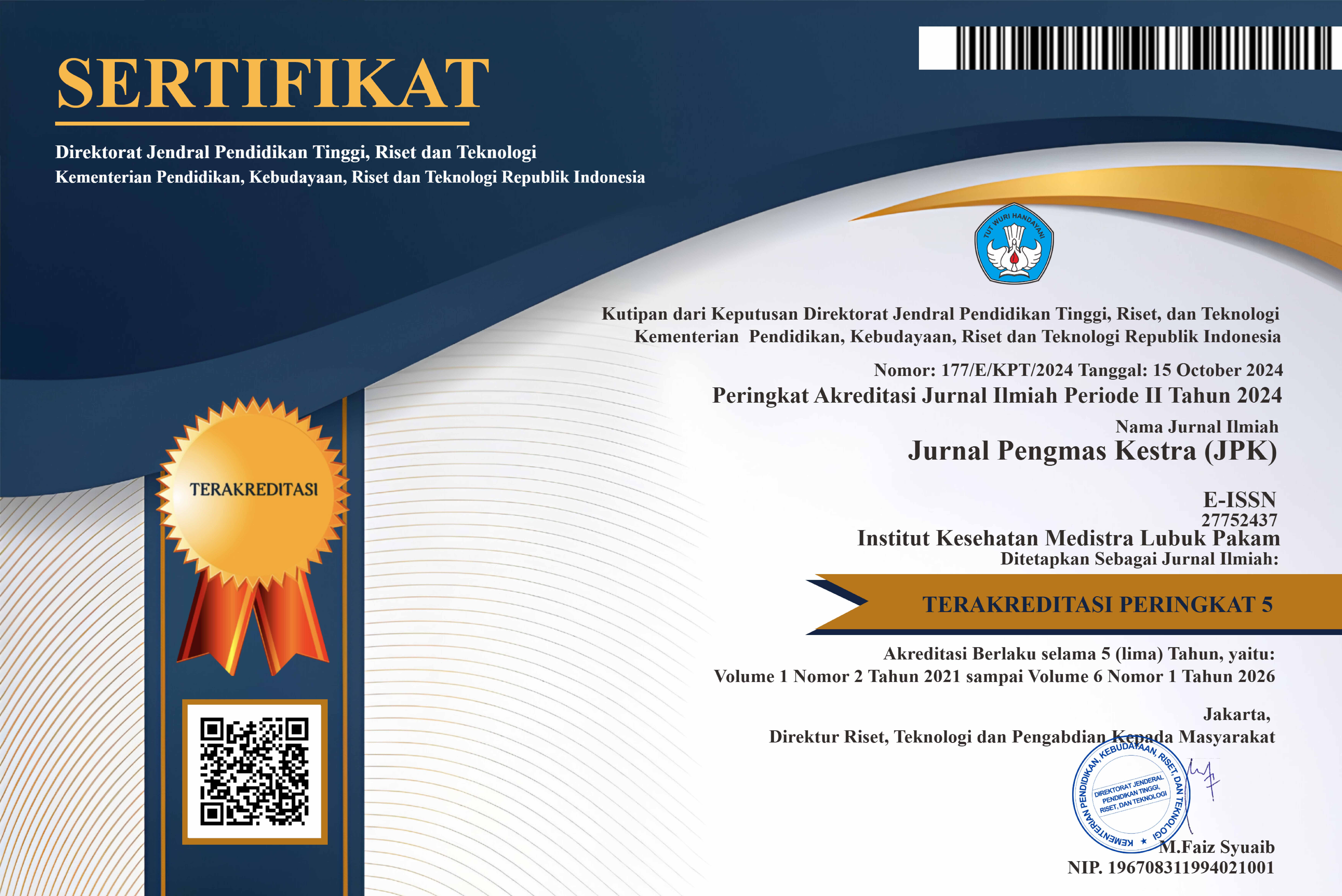THE SOCIALIZATION ABOUT THE RIMBANG FRUIT ACTIVITY TEST (SOLANUM TORVUM SWARTZ) AS AN IMMUNOSTIMULATOR
SOCIALIZATION ABOUT THE RIMBANG FRUIT ACTIVITY TEST (SOLANUM TORVUM SWARTZ) AS AN IMMUNOSTIMULATOR
DOI:
https://doi.org/10.35451/jpk.v2i2.1437Keywords:
Immunostimulator, Rimbang fruit (Solanum torvum Swartz), sheep red blood cells (SDMD), antibody titerAbstract
Decreased immune system function can occur when the invasion of foreign substances cannot be balanced by immune cells. So, we need substances or materials that can improve the immune system and increase its regulation. Rimbang fruit (Solanum torvum Swartz) is a native vegetable that has been consumed by local people for a long time. Previous research stated that rimbang fruit is rich in phenolic compounds, namely flavonoid derivatives, namely flavonols (quercetin, kaempferol, and myricetin) and flavones (apigenin and luteolin). These secondary metabolites indicate that rimbang fruit has the potential to regulate the regulation of the immune system supported by its high antioxidant power. The research method used experimental methods, extraction method with 96% ethanol solvent maceration method. Variations in the dose of rimbang fruit extract used were doses of 50%, 100%, 200%, and 400%. The positive control used was Levamisole. The negative control used was CMC-Na 0.5%. The immunomodulator test method uses the antibody titer method using male rats as test animals. Immunogens used sheep red blood cells. Information provided to pharmacy students. From this it was concluded that the rimbang fruit extract had an immunostimulating effect at an optimal dose of 400 mg/kg body weight. These findings are shared with students and the public through Zoom meetings to help them understand the benefits of rimbang as an immunostimulator.
References
Antari, A. L. (2017). Fundamental Immunology. Yogyakarta: Depublish.
Govind, P., Madhuri., dan Mandloi. (2012). Immunostimulant effect of Medicinal Plants on Fish. International Research Journal of Pharmacy. 3(3): 112-114.
Kusuma, R.A. Andarwulan, N. (2012). Efek antioksidan ekstrak buah gurita (Solanum torvum Swartz.). Bogor:Institut Ilmu dan Teknologi Pangan. Balai Penelitian Pertanian Bogor. Halaman:1-6.
Marbun, R., Suwarso, E., & Yuandani, Y. (2018). Immunomodulatory effects of ethanol extract artemisia vulgaris l. In male rats. Asian Journal of Pharmaceutical and Clinical Research. 11(13): 245-247.
Marbun, R.; Siregar, S.; Hasibuan, A.; Sinurat, J.; Syarifuddin, A.; Octora, D.; Rizky, V. and Gurusinga, R. (2020). The Immunomodulatory Activity of Pirdot Leaf Extract (Sauraia Vulcani korth.) on the Immune System of Male Rats. In Proceedings of the International Conference on Health Informatics and Medical Application Technology - ICHIMAT, ISBN 978- 989-758-460-2, pages 515-520. DOI: 10.5220/0009973805150520
Sukmayadi, A., Sumiwi, S, and Barliana, M. (2014). Immunomodulatory Action of Tempuyung (Sonchus arvensis Linn.) Leaf Ethanol Extricate. Padjadjaran College Drug store Research facility. 2(1): 66-67.
Yulis, K. (2016). Pengaruh ekstrak etanol daun hawthorn terhadap peningkatan sistem imun yang diinduksi prednison pada mencit. kertas. Fakultas Farmasi. Universitas Sumatera Utara. Halaman 37-39.
Downloads
Published
Issue
Section
License
Copyright in each article is the property of the Author.




















